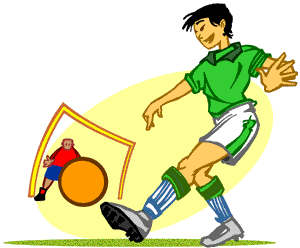|
I
can do it
Brainstorm a list of
physical activities your students like to do. Ask students to tell
you whether they can do them well, would like to do them better,
or aren't interested at all.
Explain that the ability
to do these things means they already have achieved a certain level
of functional (I can) fitness.
Ask the students to suggest
what would improve their ability to do the things they like.
E.g.,
if I could run faster, I could get to the goal sooner; if I could
run longer, I could get to my friend's house without being tired.

Ask them to suggest ways
to improve the fitness components they feel they need or want to
improve.
Examples:
I
could do stretching activities so I could be more flexible in
dance class.
I could use the horizontal ladder in the playground to build up
my arm muscles so I could throw a ball further.
From your brainstorming
list, choose an activity that the majority of the class enjoys doing
in physical education, but would like to do better. Then ask the
class what they would need to do to improve. (You've just met a
Goal Setting outcome! General Outcome "D")
Example: The class decides
that floor hockey is a sport they all like, but they would really
like to improve. Play for 15 minutes.
Then have the students
identify the primary fitness component required. For this game cardiovascular
endurance is the primary component, although both muscular strength
and endurance are required as well. Now, can they brainstorm three
activities they could do that would improve their cardiovascular
endurance, and help them improve their ability to play floor hockey.
Examples:
Run to their friend's house instead of using the phone.
Chase butterflies and slow dogs.
Play the game with an older sibling to increase the pace.
back
to top
|


